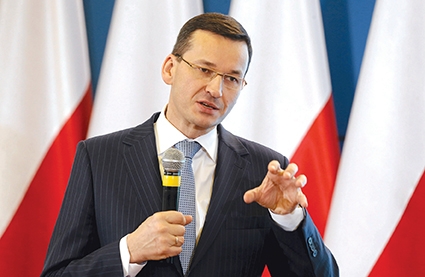Poland Sees Nord Stream-2 as “Suicidal” for Ukraine
Poland's Minister of Finance, Mateusz Moravetsky, became Prime Minister this month following the resignation of former government head Beata Szydlo. The new head of the Polish government has since stated he believes that the implementation of the Nord Stream-2 project is a harmful initiative that threatens the energy security of Central Europe.
“In our opinion, Nord Stream-2 is an extremely harmful project that threatens the security of Central Europe, and can be deadly for Ukraine. When Ukraine is excluded from the gas transit process, nothing will prevent its further destabilization,” Moravetsky said, adding that Nord Stream-2 “simultaneously strengthens Germany's ties with Russia” and “Poland again faces the diktat of price from Gazprom and Russia.”
Moravetsky believes that Poland needs to support its liquefied natural gas (LNG) terminal in Swinoujscie, where Warsaw expects to receive LNG from the US as well as for negotiations on the construction of the Baltic gas pipeline: a pipeline through Denmark which is to connect Poland with the Norwegian shelf.
The OPAL (Ostsee-Pipeline-Anbindungsleitung) is a natural gas pipeline in Germany running along the country’s eastern border. The OPAL pipeline is one of two projected pipelines connecting the Nord Stream to the existing pipeline grid in Middle and Western Europe, the other being the NEL pipeline. Thanks to OPAL, they can now increase the flow of gas through Nord Stream-1, which is not yet being used at full capacity. It is believed that an increase in transmission via OPAL, and therefore through Nord Stream-1, can “satisfy Gazprom so much that it will refuse to build Nord Stream-2,” declared Polish Foreign Minister Witold Vashchikovsky.
Earlier, after it became known that Gazprom could go with the OPAL option, Poland declared that it would take "all sorts of legal steps" in connection with the increased access of the Russian gas holding to the capacity of this gas pipeline, as such would compete with the Polish Swinoujscie LNG terminal and the future supply of “blue fuel” from Norway and the US, which Poland intends to supply to southern Europe.
Poland also fears it will cease to play a key role in transporting Russian gas to European countries after the European Commission (EC) allowed Gazprom to use up to 90% of the capacity of the OPAL gas pipeline in Germany.
“In addition, thanks to OPAL and Nord Stream-1, Russians will create a path over land and water, bypassing Poland,” declared Vashchikovsky.
“If Gazprom gets OPAL, the Yamal gas pipeline, laid through the territory of Poland, will lose its importance. Therefore, we will try to block the transfer of OPAL to the hands of the Russians,” he said, noting Poland's plans to challenge the decision of the EC on OPAL in a judicial procedure.
On October 28, the EC approved the expansion of Gazprom's access to the OPAL gas pipeline, which is a continuation of the already-operating Nord Stream-1 gas pipeline which was built with the help of Gazprom. However, the Russian side could not fully use this pipe, since the European Union immediately recalled the so-called Third Energy Package. The European Union's Third Energy Package is a legislative package for an internal gas and electricity market in the EU. Its purpose is to further open up the gas and electricity markets there. The package was proposed by the EC in September 2007, and adopted by the European Parliament and the Council of the European Union in July 2009. It entered into force on 3 September 2009.
Ukraine has reacted very painfully to the decision of the EC, according to which Gazprom is allowed to use up to 90% of the OPAL gas pipeline capacity. As a result, Gazprom is given an opportunity to increase gas exports to the EU via this gas pipeline, bypassing Ukraine by more than 9 billion cubic meters per year. In this regard, the Ukrainian Foreign Ministry even said that the EU leadership, before making such a decision, should have first consulted with Kyiv.
Dimitri Dolaberidze











